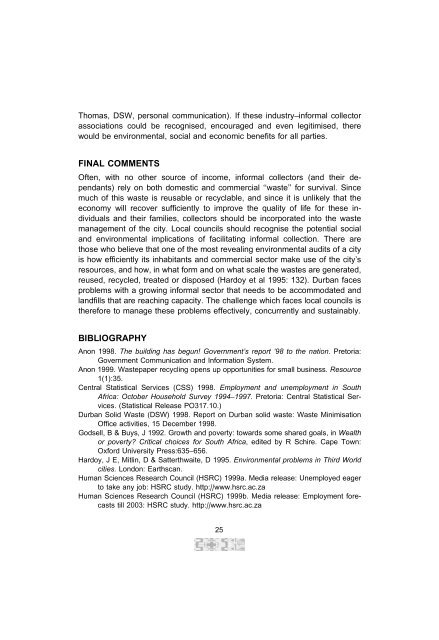AFRICANUS Vol 30 No 2 ISSN 0304-615X - University of South Africa
AFRICANUS Vol 30 No 2 ISSN 0304-615X - University of South Africa
AFRICANUS Vol 30 No 2 ISSN 0304-615X - University of South Africa
You also want an ePaper? Increase the reach of your titles
YUMPU automatically turns print PDFs into web optimized ePapers that Google loves.
Thomas, DSW, personal communication). If these industry±informal collector<br />
associations could be recognised, encouraged and even legitimised, there<br />
would be environmental, social and economic benefits for all parties.<br />
FINAL COMMENTS<br />
Often, with no other source <strong>of</strong> income, informal collectors (and their dependants)<br />
rely on both domestic and commercial ``waste'' for survival. Since<br />
much <strong>of</strong> this waste is reusable or recyclable, and since it is unlikely that the<br />
economy will recover sufficiently to improve the quality <strong>of</strong> life for these individuals<br />
and their families, collectors should be incorporated into the waste<br />
management <strong>of</strong> the city. Local councils should recognise the potential social<br />
and environmental implications <strong>of</strong> facilitating informal collection. There are<br />
those who believe that one <strong>of</strong> the most revealing environmental audits <strong>of</strong> a city<br />
is how efficiently its inhabitants and commercial sector make use <strong>of</strong> the city's<br />
resources, and how, in what form and on what scale the wastes are generated,<br />
reused, recycled, treated or disposed (Hardoy et al 1995: 132). Durban faces<br />
problems with a growing informal sector that needs to be accommodated and<br />
landfills that are reaching capacity. The challenge which faces local councils is<br />
therefore to manage these problems effectively, concurrently and sustainably.<br />
BIBLIOGRAPHY<br />
Anon 1998. The building has begun! Government's report `98 to the nation. Pretoria:<br />
Government Communication and Information System.<br />
Anon 1999. Wastepaper recycling opens up opportunities for small business. Resource<br />
1(1):35.<br />
Central Statistical Services (CSS) 1998. Employment and unemployment in <strong>South</strong><br />
<strong>Africa</strong>: October Household Survey 1994±1997. Pretoria: Central Statistical Services.<br />
(Statistical Release PO317.10.)<br />
Durban Solid Waste (DSW) 1998. Report on Durban solid waste: Waste Minimisation<br />
Office activities, 15 December 1998.<br />
Godsell, B & Buys, J 1992. Growth and poverty: towards some shared goals, in Wealth<br />
or poverty? Critical choices for <strong>South</strong> <strong>Africa</strong>, edited by R Schire. Cape Town:<br />
Oxford <strong>University</strong> Press:635±656.<br />
Hardoy, J E, Mitlin, D & Satterthwaite, D 1995. Environmental problems in Third World<br />
cities. London: Earthscan.<br />
Human Sciences Research Council (HSRC) 1999a. Media release: Unemployed eager<br />
to take any job: HSRC study. http://www.hsrc.ac.za<br />
Human Sciences Research Council (HSRC) 1999b. Media release: Employment forecasts<br />
till 2003: HSRC study. http://www.hsrc.ac.za<br />
25
















